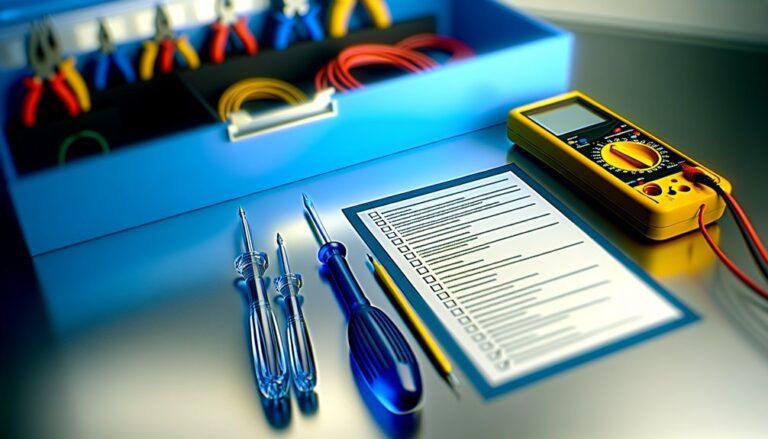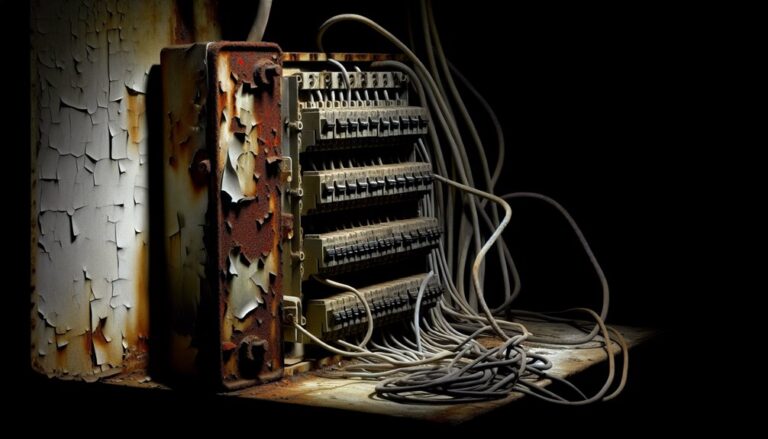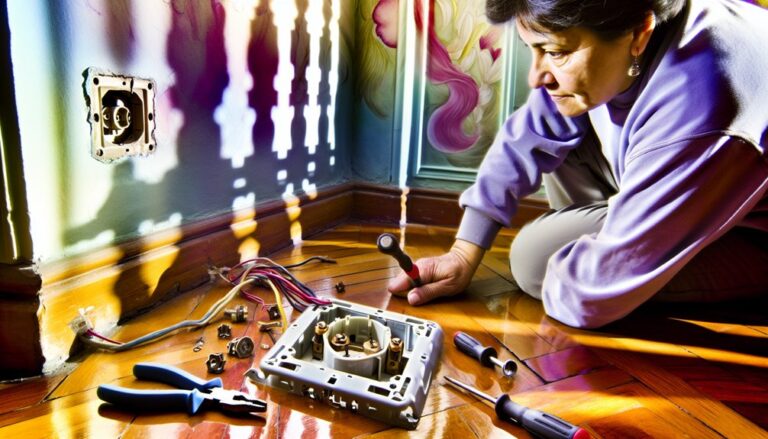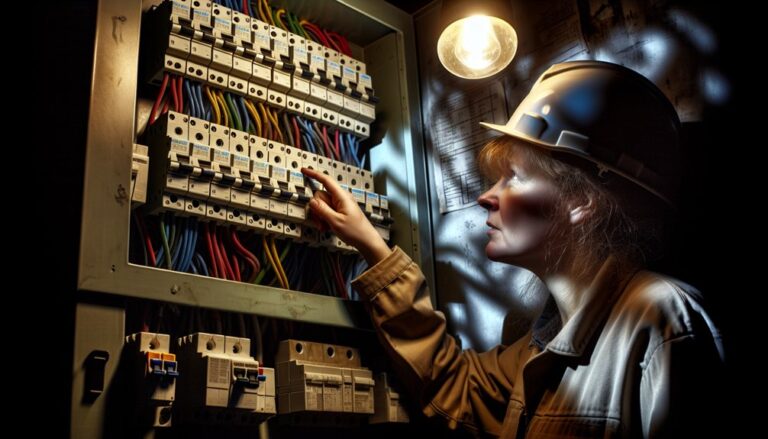Questions for Electrical Contractors
When hiring an electrical contractor, ask about their qualifications and licenses to guarantee compliance with state regulations. Inquire about their years of experience and request references from previous clients to gauge reliability. Explore the types of projects they’ve handled and how they manage permits and inspections. Make certain to understand their payment structure and whether they offer warranties. Finally, discuss their approach to safety and compliance standards to protect your interests. Discover more insightful questions to ask.
Key Takeaways
- Inquire about the contractor’s licensing and certifications to ensure compliance with local regulations and industry standards.
- Ask about their experience with similar projects to gauge their capability in handling your specific electrical needs.
- Request client references to verify the contractor’s reliability, quality of work, and adherence to budgets and timelines.
- Discuss the payment structure and warranty terms to understand financial obligations and coverage for workmanship.
- Confirm their safety protocols and reporting processes to ensure a commitment to safe work practices and compliance with regulations.
What Are Your Qualifications and Licenses?
When evaluating an electrical contractor, what qualifications and licenses do they hold?
You’ll want to investigate their compliance with the licensing process, as this guarantees they meet state regulations. Most states require contractors to obtain a license, which involves passing specific exams that evaluate their technical knowledge and practical skills.
Educational requirements often include a high school diploma or GED, followed by formal training through apprenticeships or technical schools.
This foundational education is vital for understanding electrical theory, safety protocols, and local codes.
Additionally, you should verify if they possess any specialized certifications, which can enhance their credibility and expertise in specific areas of electrical work.
Evaluating these factors will help guarantee you hire a qualified professional for your electrical needs.
How Many Years of Experience Do You Have?
How essential is experience when selecting an electrical contractor? The longevity of their experience directly correlates with their ability to handle complex projects and troubleshoot unforeseen issues.
Evaluating their expertise is vital for ensuring safety and compliance with regulations.
- Proven track record of successful projects
- Ability to adapt to evolving technologies
- Familiarity with local codes and regulations
- Insight into efficient and cost-effective solutions
- Enhanced problem-solving skills developed over time
Asking about their years in the field not only reveals their experience longevity but also provides insight into the depth of their knowledge.
A contractor with extensive experience is likely to deliver higher quality work, reducing the likelihood of costly mistakes.
Prioritize this factor in your selection process.
Can You Provide References From Previous Clients?
Why is it essential to ask for references from previous clients when selecting an electrical contractor? Client feedback directly impacts your understanding of a contractor’s reliability and quality. By examining past project satisfaction, you can gauge their performance and work ethic. Here’s a quick overview of what to look for in references:
| Reference Type | Key Considerations | Expected Outcome |
|---|---|---|
| Residential Clients | Satisfaction with residential work | High-quality finishes |
| Commercial Clients | Timeliness and budget adherence | Efficient project delivery |
| Industrial Clients | Compliance with safety standards | Safe and functional installations |
Ultimately, verifying references guarantees you choose a contractor who meets your specific needs and expectations.
What Types of Projects Have You Worked On?
What types of projects have you tackled in the past? Understanding your experience in both residential projects and commercial installations is essential. This insight not only reflects your expertise but also your adaptability to various environments.
Consider the following types of projects:
- Home electrical rewiring for safety and efficiency.
- Lighting installations in residential spaces to enhance ambiance.
- Commercial office setups for optimized energy usage.
- Industrial electrical systems that meet stringent regulations.
- Smart home technology integration for modern convenience.
These examples showcase your versatility and proficiency in managing different scales and complexities of projects.
How Do You Handle Permits and Inspections?
Managing permits and inspections can be a complex process, but it’s essential for ensuring compliance and safety in your electrical projects.
You’ll want to familiarize yourself with the local permit process, as regulations can vary considerably by jurisdiction. Begin by submitting the necessary application forms, along with detailed plans that meet the inspection requirements.
It’s important to maintain clear communication with local authorities throughout this phase. Schedule inspections promptly to avoid project delays, and be prepared to address any issues the inspector raises.
Keeping accurate records of all permits and inspection reports is critical for future reference, ensuring that you fulfill all legal obligations and maintain high standards in your work.
This diligence ultimately protects both your business and your clients.
What Is Your Estimated Timeline for Completion?
When can you expect your electrical project to be completed? Understanding the estimated timeline is essential for effective project management and proper time allocation.
An experienced contractor will provide a realistic timeframe based on several factors, including:
- Scope of work
- Availability of materials
- Labor resources
- Weather conditions
- Regulatory approvals
Can You Provide a Detailed Written Estimate?
How can you be certain that the costs of your electrical project align with your budget? The answer lies in obtaining a detailed written estimate from your contractor.
This estimate should include a detailed breakdown of all costs associated with the project scope. By reviewing this document, you can identify any potential surprises and assess whether the proposed expenses fit your financial plan.
Confirm the estimate outlines labor, materials, and any additional fees. A transparent estimate not only clarifies pricing but also sets expectations for project execution.
Don’t hesitate to ask questions about any unclear items in the estimate, as this will guarantee you have a complete understanding of the costs before proceeding.
What Is Your Payment Structure?
What payment structure do you offer for your electrical services? Understanding your payment options is vital for project financing and budgeting.
Different contractors may have varying structures, so it’s important to clarify before starting any work. Here are some common aspects to keep in mind:
- Fixed-rate pricing for specific tasks
- Hourly rates with detailed time tracking
- Progress payments based on project milestones
- Flexible payment plans for larger projects
- Accepting various payment methods (credit cards, checks, etc.)
Do You Offer Warranties for Your Work?
Understanding the payment structure is just the beginning; warranty offerings also play a significant role in selecting an electrical contractor. When evaluating contractors, inquire about their warranty coverage. A robust warranty reflects their confidence in workmanship and materials.
It’s essential to understand the specifics—what’s included, the duration, and any exclusions. Many reputable contractors provide service guarantees, ensuring that if issues arise within the warranty period, they’ll address them promptly at no additional cost. This not only protects your investment but also establishes a long-term relationship based on accountability.
Don’t hesitate to request written documentation outlining warranty terms. By prioritizing warranty offerings, you’re safeguarding your project against unforeseen complications, ensuring peace of mind throughout the lifespan of your electrical work.
How Do You Address Safety and Compliance Standards?
When selecting an electrical contractor, it’s crucial to guarantee they prioritize safety and adhere to compliance standards. Understanding their approach to safety protocols and compliance regulations can safeguard your project and assure quality work.
Consider asking the contractor about:
- Their training programs for safety protocols
- The frequency of compliance audits conducted
- The specific regulations they follow for your project
- Their process for reporting and addressing safety violations
- How they keep updated on changes in compliance regulations
A contractor who values these aspects demonstrates a commitment to professional integrity and risk management.
About Us
We understand that electrical issues can be stressful and overwhelming. That’s why we are here to lend a helping hand and provide you with the best electrical services in town. As a team of experienced electricians, we take pride in our ability to solve any electrical problem with precision and care.
Pages
Follow us
© 2026 By Electrician Fort Lauderdale Today








